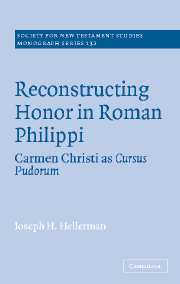Book contents
- Frontmatter
- Contents
- Acknowledgments
- List of abbreviations
- Introduction
- 1 Roman social organization
- 2 Preoccupation with honor and the cursus honorum
- 3 The Roman colony at Philippi
- 4 Honor and status in Philippi
- 5 Acts and Philippians
- 6 Carmen Christi as cursus pudorum
- 7 Summary and conclusion
- Notes
- References
- Index of ancient sources
- Index of modern authors
- Subject index
4 - Honor and status in Philippi
Published online by Cambridge University Press: 22 September 2009
- Frontmatter
- Contents
- Acknowledgments
- List of abbreviations
- Introduction
- 1 Roman social organization
- 2 Preoccupation with honor and the cursus honorum
- 3 The Roman colony at Philippi
- 4 Honor and status in Philippi
- 5 Acts and Philippians
- 6 Carmen Christi as cursus pudorum
- 7 Summary and conclusion
- Notes
- References
- Index of ancient sources
- Index of modern authors
- Subject index
Summary
And in these various colonies you may behold copies of the customs and the form of government which their founders enjoy.
Dio Chrysostom (Or. 30.26)The overview of the social environment of Roman Philippi continues in this chapter with a survey of further evidence for preoccupation with honor and status among both the elite and the non-elite in the colony. The previous chapter introduced the military cursus and examined various honors that were available through the imperial cult. We now turn our attention to the civic cursus and the social environment of local cult groups. I will first demonstrate that concern for honors strongly characterized the public life of Philippi's local elite (generally restricted here to the decurion class and higher). A number of surviving inscriptions detail the ascension of various colonists through a series of honorific posts, culminating with membership in the decurion council and, at times, the highest office in the colony (duumvir). The balance of the chapter highlights the replication of elite values in non-elite circles in Philippi. A generous epigraphic database generates much evidence for honorific posts in voluntary cult groups, such as those dedicated to the veneration of Silvanus and Dionysus, robustly attesting to the vitality of a replicated cursus honorum in non-elite social settings in the colony. Against this background, Paul's portrayal of Jesus’ descent of what I will identify in a later chapter as a cursus pudorum will have special meaning for the small Christ-confessing community in Philippi.
- Type
- Chapter
- Information
- Reconstructing Honor in Roman PhilippiCarmen Christi as Cursus Pudorum, pp. 88 - 109Publisher: Cambridge University PressPrint publication year: 2005



